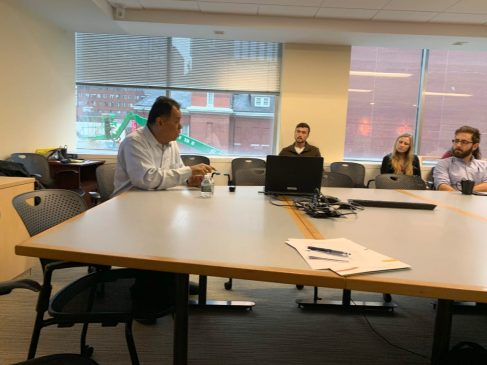Speaking in Cambridge, US, Ari Kuncoro Outlined the Relations of Economists with Policy Makers in Indonesia
Nino Eka Putra ~ Humas FEB UI
DEPOK – Dean of the FEB UI as well as Chosen UI Chancellor who will be inaugurated on 4 December, attended the NBER / BREAD Development Economics Fall Program Meeting and was a speaker to present on “How Economists Connect to Policy Makers in Indonesia: A Personal Reflection” which took place at the J office -PAL, Building E19 Room 201, Cambridge, Massachusetts, United States, at (22-23 / 11/2019).
Ari Kuncoro as the Dean of the FEB UI as well as the Chancellor of the Chosen UI explained that the history of the economic profession that began in 1945 until 1965 still does not exist. At that time, only three professions existed such as medical doctors, lawyers, engineering, book keepers from the trade school, and management school. In the late 1960s, professors from the Netherlands were replaced by professors from America, especially from the University of California. With a scholarship from Ford Foundation University Indonesia, start sending students to universities in America. National figure, Wijoyo Nitisastro, Ali Wardhana then formed an Economist group from the University of Indonesia.
Then, in the New Order era of 1965-1985, there was no dichotomy between policy makers and policy research. There was a conflict between technocrats (Wijoyo) and engineers (Habibie) about how Indonesia should develop itself. From there then emerged several government institutions / institutions such as Bappenas, LPEM as think thank institute, research at CPIS in the Ministry of Finance, and Gajahmada University as rivals think thank.
After that, in 1986-2004 many engineers switched professions to become economists. Since that time, independent celebrity economists have emerged that are not affiliated with the government in mutual fund companies, state-owned banks, the emergence of INDEF & Economists from IPB, and SMERU. Research at the Ministry is contracted to universities and the World Bank, ADB, JICA as a source of research funding for policy research but is almost always not used by the government.
And finally, from 2005 until now there has been an increase in the role of the Australian government in influencing policy through the assistance of the ANU project in Indonesia. The willingness of the government to use research as a policy base. Economists from renowned universities have a big influence in policy making. In addition, economic celebrities create fame, wealth and influence but have less influence on the government.
“This shows that universities are expected to further increase international exposure. Basically, publications in reputable indexed international journals are on the rise. The research population is different between academic research and policy with the advancement of information from various media such as the internet, social media, television, radio, and so on,” explained Ari.
On the other hand, JPAL introduces RCAT to policy makers in Indonesia. Academic research is more accessible to policy makers with recommendations that are more user-friendly and are used in micro interventions such as cash transfers for the poor.
“Going forward, the priority research topics of DIKTI, namely information technology, the impact of the internet on behavior, poverty alleviation, stunting on children’s families & communities, democratic governance & public policy, energy, restoring the earth’s natural support system, sophisticated technology, culture, planning city and transportation, and traditional studies,” he concluded. (Des)



